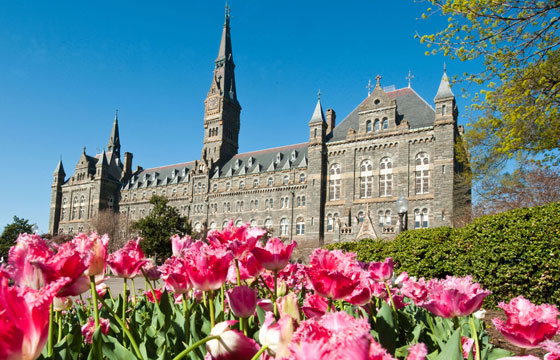Last month, the office of the provost emailed the Georgetown community to announce that tuition rates for the 2018-2019 academic year would be raised by 3.5 percent. Georgetown is just one of many colleges nationwide where the cost of attendance is steadily increasing out of proportion to inflation. The trend towards more expensive tuition is unsustainable, and harms both students and the ideals of the American higher education system. A college education is becoming out of reach for many because of its cost, and the financial burden that a college education places on those who do graduate is eroding the concept of secondary education as a means for social mobility.
This editorial board’s response, though, comes at the risk of sounding repetitive. Tuition increases have settled into a steady routine, as the university’s annual announcement is greeted with initial outrage which later subsides into apathy without any substantive opposition to the hike. The challenge for Georgetown students then is to maintain a critical outlook when thinking about tuition changes, and not to accept the rising cost of a college education as simply normal. Moreover, students at Georgetown must understand the tuition changes at Georgetown within in a national context, in which students like themselves across the country are facing similar challenges in an educational system that is deeply flawed.
The debt that students incur while going to college becomes a financial burden that can have lingering effects for years after graduation. Higher education, once the foundation of American social mobility, is now so expensive that it weighs graduates down. Meanwhile, the job market for those without a college degree is shrinking, putting those who cannot afford to attend college at a greater disadvantage than ever. The tuition hikes that continue to create ballooning costs for attending college come in the form of marginal increases year to year, announced over email.
To be sure, Georgetown’s tuition increases are not outside the norm of other colleges. Georgetown’s most recent hike is also less than anticipated because of the university’s efforts to cut costs and increase revenues, according to the email. The editorial board commends Georgetown’s efforts to minimize the increase in tuition, as well as Georgetown’s commitment to meet all demonstrated need for financial aid. Still, while some competing universities have embraced no-loan financial aid policies, Georgetown packages continue to feature loans. The university has demonstrated a receptiveness to students’ complaints: After criticism over its lack of transparency surrounding tuition hikes announced for the 2016-2017 school year, the university addressed tuition in a roundtable discussion in November 2017. The problems with college tuition go beyond Georgetown.
However, Georgetown’s tuition increases are still part of a higher education system that is putting severe financial burdens on many students and excluding others through its cost. American higher education is broken. This editorial board calls on all students to demand more of their universities when it comes to affordability, and calls on Georgetown to fully commit to slowing the trend of increasing prices for college.







[…] Georgetown Must Make Tuition Affordable The Georgetown Voice […]